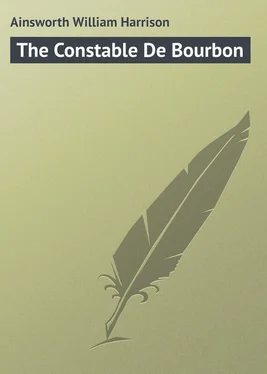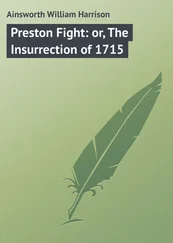William Ainsworth - The Constable De Bourbon
Здесь есть возможность читать онлайн «William Ainsworth - The Constable De Bourbon» — ознакомительный отрывок электронной книги совершенно бесплатно, а после прочтения отрывка купить полную версию. В некоторых случаях можно слушать аудио, скачать через торрент в формате fb2 и присутствует краткое содержание. ISBN: , Жанр: foreign_prose, на английском языке. Описание произведения, (предисловие) а так же отзывы посетителей доступны на портале библиотеки ЛибКат.
- Название:The Constable De Bourbon
- Автор:
- Жанр:
- Год:неизвестен
- ISBN:http://www.gutenberg.org/ebooks/49681
- Рейтинг книги:3 / 5. Голосов: 1
-
Избранное:Добавить в избранное
- Отзывы:
-
Ваша оценка:
- 60
- 1
- 2
- 3
- 4
- 5
The Constable De Bourbon: краткое содержание, описание и аннотация
Предлагаем к чтению аннотацию, описание, краткое содержание или предисловие (зависит от того, что написал сам автор книги «The Constable De Bourbon»). Если вы не нашли необходимую информацию о книге — напишите в комментариях, мы постараемся отыскать её.
The Constable De Bourbon — читать онлайн ознакомительный отрывок
Ниже представлен текст книги, разбитый по страницам. Система сохранения места последней прочитанной страницы, позволяет с удобством читать онлайн бесплатно книгу «The Constable De Bourbon», без необходимости каждый раз заново искать на чём Вы остановились. Поставьте закладку, и сможете в любой момент перейти на страницу, на которой закончили чтение.
Интервал:
Закладка:
“I am of opinion that the king will return a very different answer, sir,” said Bourbon. “He knows he has treated me unjustly, and when he finds I am in a position to obtain redress, he will offer it. But be his decision what it may, I am prepared.”
“I would fain remonstrate with your highness before you take this terrible step,” said Warthy. “Powerful as you are, you cannot resist the king.”
“That remains to be seen, sir. I am resolved to have justice, which has been so long denied me.”
“Then at the hazard of my life I must perform mv duty,” rejoined Warthy, boldly. “I now proclaim to all your followers that if they shall aid you in holding this castle against their sovereign lord and king, to whom, and not to you, they owe fealty and homage, they will be guilty of lèse-majesté, and will be treated as rebels and traitors.”
“Will your highness allow this insolent fellow to brave you thus?” cried Pomperant, furiously. “Order his instant execution.”
Warthy did not blench, though he felt he was in a most critical position.
“Remember, I am sent hither by the king,” he said.
“The king cannot save you!” cried Tansannes.
“No, but he can avenge me,” replied Warthy, resolutely.
“The audacious spy deserves a dog’s death,” cried François du Peloux. “Let him be hanged at once.”
“Or flung from the battlements,” said Saint-Saphorin.
“No,” said Bourbon; “he has given his tongue unwarrantable license, but he has come hither as the king’s messenger, and his person is safe. You must be content to remain here till to-morrow, Messire de Warthy, when you will take a letter from me to the king. The Bishop of Autun, who is here, shall accompany you, in order that he may explain my conduct to his majesty.”
“I must perforce remain as long as your highness chooses,” replied Warthy.
“You ought to thank me for detaining you,” said Bourbon. “You must want rest after your journey. See that all care be taken of him,” he added to an attendant.
Upon this Warthy withdrew.
After inspecting the garrison, Bourbon proceeded to examine the defences of the fortress, to make sure of its capability of resisting a siege. The examination was very carefully conducted, and occupied several hours. At its conclusion, he held a private conference with all his chief adherents, at which it was unanimously agreed that the place was not strong enough to hold out against the powerful army which would infallibly be sent to besiege t by the king.
“If it should fall before I can be reinforced, my cause will be ruined,” said Bourbon; “and the German lanz-knechts enrolled by the Archduke Ferdinand, though already assembled in the Franche-Comté, will not dare to enter France while the king remains at Lyons. For my own part,” he continued, “I am satisfied that his majesty is too much alarmed to quit the kingdom at present, and if he should decide on crossing the Alps, he will assuredly leave behind him an army of six or seven thousand men. The presence of such a force will prevent the contemplated rising, and the nobles of Auvergne, whom I had summoned by the arrière-ban to unite at Roanne, will disperse without striking a blow. What is to be done under these circumstances? Shall we retire to Carlat? Though more inaccessible, that castle is no better able to stand a siege than the fortress we now occupy.”
“To be shut up amid the mountains might be fatal,” remarked Tansannes. “Let us make the best of our way to the Franche-Comté, where your highness can put yourself at the head of the German lanz-knechts.”
“The lanz-knechts are already commanded by two able leaders, the Counts Wilhelm and Felix de Furstenberg,” replied Bourbon. “I will not become a fugitive from my own territories while there is a chance of holding them. A few days will now decide. My letter, which will be conveyed to the king by Warthy, will bring the matter to a crisis. If, as I fear, his majesty should abandon his expedition to Italy, nothing will be left for us but flight.”
Next day, Warthy left the castle, accompanied by the Bishop of Autun. On the farther side of La Palisse they encountered the Marshal de Chabannes and the Grand Master, who were marching at the head of a large force, consisting of light horsemen and fantassins, to seize the Constable. On discovering this force, the bishop contrived to send off a messenger to warn Bourbon.
The bishop himself was arrested, and sent on to Lyons with a guard, under the charge of Warthy.
X. HOW THE BISHOP OF AUTUN AND THE COMTE DE SAINT-VALLIER WERE
On a plain, outside the fair city of Lyons, was encamped the army destined for the expedition to Italy. In the midst of the camp stood the royal tent. Thither the Bishop of Autun was taken by Warthy. François had just returned from inspecting his troops. His towering figure was sheathed in glittering steel, but he had taken off his plumed helm and given it to a page, at the moment when the bishop was brought in.
After glancing at the Constable’s letter, which was delivered to him by Warthy, François tore it in pieces, exclaiming furiously, “Does the audacious traitor venture to treat me as an equal, and propose terms to me! Foi de gentilhomme! I will lower his pride. Hitherto I have acted too leniently towards him, but now he shall feel my power. I have striven to save him, but since he is insensible to my kindness, and will rush upon his ruin, e’en let him perish!”
“Your majesty forgets that you have driven the Constable to desperation,” said the Bishop of Autun. “Could he have placed faith in your promises, he would be with you now. I implore your majesty to make terms with him, and, by so doing, avoid a most disastrous war.”
“My lord bishop,” said the king, sternly, “I will not hear a word in the traitor’s behalf. He can expect no grace from me, and, by Saint Louis! he shall have none. He thinks himself safe in Chantelle, but I will take it in a week; and if he seeks refuge in the mountains of Auvergne, I will hunt him down like a wild beast. I will proclaim him as a rebel and traitor throughout the realm, and set a price of ten thousand golden crowns upon his head. All who shall harbour him, or assist him or any of His followers, shall be held guilty of treason. And now, my lord bishop, a word with you. You are concerned in this conspiracy, and, if you would obtain grace and restoration to my favour, you will not hesitate to reveal all you know respecting it.”
“I have nothing to reveal, sire,” replied the bishop.
“You are the depositary of the Constable’s secrets, my lord,” remarked François, sternly.
“Whatever his highness may have confided to me under the seal of confession, is sacred, sire,” rejoined the bishop.
“That excuse will not avail you, my lord. You are bound to disclose a conspiracy against your sovereign. By Saint Louis! I will have the truth. All those who are in any way implicated in the plot, or suspected, shall be immediately arrested. One of the chief conspirators is already in my power. I will interrogate him at once. Bring the Comte de Saint-Vallier before me,” he added to Warthy. “You will find him in the adjoining tent, with his daughter, the Comtesse de Maulévrier.”
“Am I to arrest him, sire?” demanded Warthy.
The king replied in the affirmative, and Warthy departed on his errand, returning presently with Saint-Vallier, who was guarded by two halberdiers.
Just as François was about to interrogate the prisoner, Diane de Poitiers rushed into the tent, and threw herself at the king’s feet, exclaiming:
“My father has been unjustly accused, sire. He is no traitor.”
“I trust he may be able to clear himself, madame,” rejoined the king, raising her gently. “But as it will be painful to you to listen to his examination, I must pray you to retire.”
Читать дальшеИнтервал:
Закладка:
Похожие книги на «The Constable De Bourbon»
Представляем Вашему вниманию похожие книги на «The Constable De Bourbon» списком для выбора. Мы отобрали схожую по названию и смыслу литературу в надежде предоставить читателям больше вариантов отыскать новые, интересные, ещё непрочитанные произведения.
Обсуждение, отзывы о книге «The Constable De Bourbon» и просто собственные мнения читателей. Оставьте ваши комментарии, напишите, что Вы думаете о произведении, его смысле или главных героях. Укажите что конкретно понравилось, а что нет, и почему Вы так считаете.












